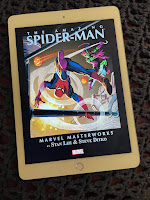
I didn't rush to read Robert B. Parker's Blind Spot, Reed Farrel Coleman's initial Jesse Stone novel, because of the high number of moderately negative to outright hostile reviews on Amazon, but figured I'd eventually get to it. I was surprised, then, that I really enjoyed the book when I finally read it. It's always a tricky thing when a new writer continues another writer's series, but this novel did a nice job with the balancing act such an arrangement requires: it honors and respects the characters and situations created by the original author, but introduces plotlines, themes, and ideas that engage the imagination of the new writer.
On that last point, maybe it's just me, but I enjoy novels where the characters have complicated interior lives and struggle with weaknesses and various psychological issues. Here Jesse Stone is struggling a little more with his drinking and a mobster / hired killer is all of a sudden struggling with guilt in the wake of his killing a young woman. Elements like this added a kind of burnished richness to the proceedings.
I also liked how Mr. Coleman subtly undid some of the changes Michael Brandman, the first writer to take over this series from Mr. Parker, made to the series to put it more in line with the Jesse Stone TV movies. Mr. Brandman, for example, moved Jesse into a waterfront house with a footbridge leading to the front door, just like the house in the TV movies. He also avoided describing Molly Crane as an Irish woman with a bunch of kids and a very specific way of bantering with Jesse, so it wouldn't contradict the Molly in the TV movies, a black woman who acted more formally around Jesse. Here, Molly is very clearly once again the Irish woman Robert Parker created, and she has her old history and personality back. And, while less obvious, Coleman seems to indicate that Jesse has moved again and is again living in a condo-like residence like he was before.
And while the editor in me actually kind of liked the clear, easily understandable "point A connects to point B" plotting of the Brandman novels, I found myself enjoying the sort of messy, organic plotting of this new book. One crook / scammer, for example, plans to use Jesse as a way to extricate himself from his mob ties, which are getting out of hand. But then he sort of forgets about that as new things attract his attention, and start interacting with Jesse in a whole different way. And Jesse himself sorts of blunders around most of the book trying to figure out what's going on, knowing that he's committed to solving the murder of the young woman that gets the plot rolling, but not much else for the longest time.
And while I don't want to overstate the idea, the book and its characters are sort of marinated in melancholy, adult concerns and regrets, and an overall tiredness at the demands of life, giving the book a more serious, literary quality we haven't seen before in either the Parker or Brandman entries. Hey, it's still a Jesse Stone detective thriller, but a more seasoned and thematically complicated one. Maybe those things will make Robert B. Parker's Blind Spot more of a slog for some people, but it wasn't for me. I enjoyed the richness.
One thing's for sure: I'm not going to wait long to read Mr. Coleman's next entry in the series, Robert B. Parker's The Devil Wins, which is out in September. I'm pretty much thinking that Jesse Stone is in good hands for the moment.




No comments:
Post a Comment